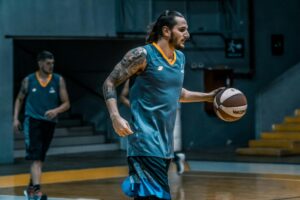Sports performance goes far beyond practice and skill. The importance of nutrition for athletes cannot be overstated. Aspects outside of your sport, like nutrition, can significantly influence a player’s development. Eating nutritious foods and having a balanced diet can help an athlete limit injury, enhance muscle recovery, decrease fatigue, boost energy levels, and improve attention span.
Limiting Injury and Stress Fractures for Athletes
Eating balanced foods can help athletes limit their risk of injury and stress fractures. In recent years, the amount of stress fractures from under-fueling has skyrocketed. Stress fractures are not only caused by too much exercise. They can also be caused by a lack of vitamins and fuel. Insufficient calcium and vitamin D intake put the athlete at risk of developing low bone mineral density and injuries.
Sources of Vitamin D and Calcium for Athletes
To help intake more vitamin D, you can consume salmon, tuna fish, and swordfish. An athlete can also get vitamin D straight from sunlight. Enjoying extra time outside can be beneficial not only to mental happiness but also physically. Some foods that can assist an athlete in reaching their calcium intake are milk (including animal milk and fortified plant milk like almond, soy, or rice), cheese, yogurt, tofu, and edamame.
Enhancing Muscle Recovery through Nutrition
With less energy from the food an athlete intakes, their recovery process will be slowed. The body may begin to extract nutrients and energy from your bones, leading to their weakening and slightly breaking over time. The athlete will have a greater risk of straining a muscle because it has not fully healed.
Optimal Post-Training Nutrition for Athletes
To prevent these injuries and maximize performance, an athlete should look for protein, carbs, and water after training. This would be a snack before an athlete could get into an actual meal. A pairing of this snack could look like a Muscle Milk protein shake, a chewy bar, and Welch’s fruit snacks. With this snack, consuming electrolytes is crucial, whether it’s Gatorade, Propel, etc. Eating carbohydrates after a workout will replenish what was burned and rebuild the glycogen stores. This will allow the body to refuel after the training and begin to prepare for the next athletic event.
Maintaining Energy Levels with Proper Nutrition
With enough caloric and vitamin intake, an athlete will feel energized, and their energy levels will stay strong. Some symptoms an athlete will experience if they are not meeting their nutrition needs are:
- Increased resting heart rate
- Decreased appetite
- Less enjoyment in their training
- Poor sleep
- Weight loss
- Poor recovery
Avoiding Poor Food Choices for Athletes
These symptoms can be caused by inadequate carbohydrate intake, insufficient food intake, or poor food choices. When an athlete travels on the road or runs from practice to practice, it can seem more accessible and more convenient to grab fast food and use excessive caffeine for energy. Without proper carbohydrate intake, the athlete’s muscles cannot restore what they have lost. Eating carbohydrates between training periods within less than 8–12 hours of one another is crucial. Although fast food and caffeine are always okay in moderation, around the training period, it is essential to intake proper vitamins and limit highly processed foods.
Nutrition can play a significant role in an athlete’s performance. The importance of nutrition for athletes is evident in how it helps limit injury, enhance muscle recovery, and maintain energy levels. Eating properly can give athletes an advantage over their competitors and decrease their chances of injury. Private coaches know this, and they can offer game-day tips to help you optimize performance. Find a private sports coach near you and start taking lessons today.




